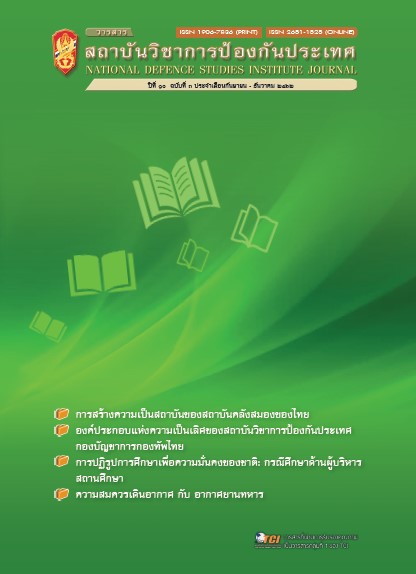Institutionalization Building of Thai Think Tank Institute
Main Article Content
Abstract
The purpose of research on “Institutionalization of Thai Think Tank Institute” were to study patterns,
concepts, and roles of think tanks in public administration and classify think tanks in Thailand
and to propose guidelines for the institutionalization of think tanks that could meet Thai contexts.
This research applied qualitative methodology including in-depth Interviews and focus group
discussions. Data were collected from key informants: executive or ex-executive in the government
and Thai and foreign think tank academic officers.
The research result revealed that there were two key factors for institutionalization. First,
a think tank Institute should apply the parallel
administrative structure with pre-approval and Besides, principles to its administration. This could
facilitate the audit process and the establishment as well as the disbandment of the institute.
Besides, public participation and private sector participation should be encouraged. Second,
there should be laws and regulations on think tanks including responsible person determination,
nomination criteria, requirement, a term of office, etc. The research found two forms of Institutionalization that could meet Thai context: advocacy think
tank and party think tank.
The research recommended that the public sector should encourage the establishment
of think tanks and allow public participation. An established think tank, however, should
be legally accredited. It is possible to apply tax incentives for the establishment of think tanks that
could lead to sustainability. In Also, the national leader’s thinking should be strengthened.
Think tank could be institutions of the third idea which have freedom of thoughts and could be
audited by responsible government organizations. Finally, they should support political parties
to strengthen them as well as the national democratic system.
Article Details
The articles, images, tables, graphs, written content, and opinions published in this journal are solely those of the authors and do not necessarily reflect the views or positions of the National Defence Studies Institute or its academic affiliates.
References
เกรียงศักดิ์ เจริญวงศ์ศักดิ์. (๒๕๕๙). คลังสมอง (Think Tank) กับการพัฒนาประเทศไทย. สืบค้นจาก http:// www.
kriengsak.com
จุฑามาศ พูลสวัสดิ์. (๒๕๕๘). คลังสมอง (Think Tank): พัฒนาการและการจัดลำดับปีล่าสุด. สืบค้นจาก https://www.
slideshare.net/Klangpanya/think-tank-47549300
ประเวศ วะสี. (๒๕๖๑). สามเหลี่ยมเขยื้อนภูเขาในงานสมัชชาสุขภาพระดับพื้นที่. สืบค้นจาก https://www.ldm.in.th/
cases/5241
พระราชกฤษฎีกา จัดตั้งโรงพยาบาลบ้านแพ้ว (องค์การมหาชน) พ.ศ. ๒๕๔๓ และที่แก้ไขเพิ่มเติมฉบับที่ ๒ พ.ศ.๒๕๖๒.
เล่ม ๑๓๖ ตอนที่ ๗๒ ก หน้า ๑๑๔-๑๑๕ ประกาศใช้ ๒๘ พฤษภาคม พ.ศ.๒๕๖๒.
ศูนย์มานุษยวิทยาสิรินธร (องค์การมหาชน). (๒๕๖๑). ประวัติและโครงสร้างหน่วยงาน. สืบค้นจาก https://th.wikipedia.
org/ศูนย์มานุษยวิทยาสิรินธร.
Alberson. (2006). พัฒนาการของ Think-Tank ในสหรัฐ. สืบค้นจาก www.trf.or.th/index.php?option=com_
content.
Bevir, M. (Ed.). (2007). Institutionalization. Encyclopedia of Governance. Thousand Oaks, CA: SAGE
Publications, Inc.
Boston, Jonathan. (1991). “The Theoretical Underpinning of Public Sector restructuring in New Zealand,”
in Reshaping the State: New Zealand’s Bureaucratic Revolution. Auckland: Oxford University.
Denhardt, J. and Denhardt R.B. (2000). The New Public Service: Serving not Steering. New York:
M.E. Sharpe, Inc.
Dye, T.R. (2016). Understanding Public Policy. (15th ed). Pearson: Florida State University.
Fischer, F., Miller, G.J., Sidney, M.S. (2006) Policy Formulation: Design and tools. Handbook of Public
Policy Analysis (1st Ed.). Taylor & Francis Group, NY: CRC Press.
Huntington, S.P. (1973). Political Order and Political Decay. Political Order in Changing Socie-ties; (pp.12).
New Haven and London: Yale University Press.
MaGann, J.G., Weaver R.K. (2017). Catalysts for Ideas and Action. Think Tank & Civil Societies
(Revised ed.). Taylor & Francis Group, NY: Routledge.
McGann, J.G. (2019). 2018 Global Go To Think Tank Index Report. Pennsylvania: Think Tanks & Civil
Societies Program. The Lauder Institute, University of Pennsylvania.
Peters, B. G., & Jon Pierre. (2007). Handbook of Public Administration: Concise Paperback Edition.
Salisbury, R.H. (1968). The analysis of public policy: a search for theories and roles. Political science
and public policy. Chicago: Markham.
Siam Intelligence. (2558). บทสัมภาษณ์พิเศษ ทรงศักดิ์ สายเชื้อ: Think Tank จะเป็นเครื่องนำเสนอความคิด
ให้ส่วนราชการ. สืบค้นจาก http://www.siamintelligence.com/songsak-interview/
Zhu, Xufeng. (2013). The Rise of Think Tanks in China. China Policy Series. Taylor & Francis Group,
NY: Routledge.


